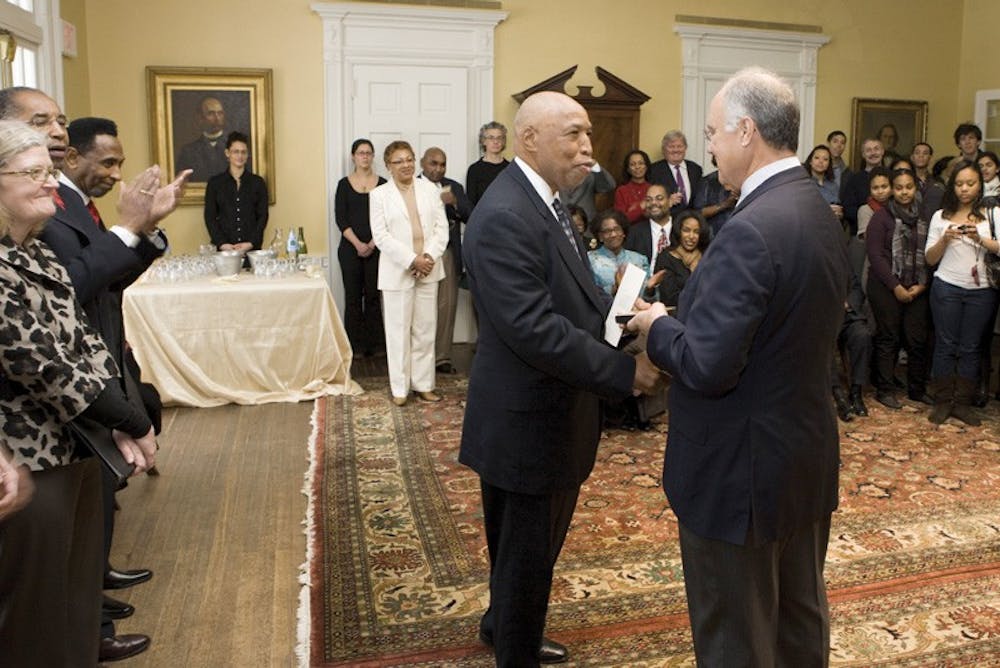With the start of Black History Month around the corner, the University celebrates a major milestone in its own history - the 50th anniversary of the first black student to enroll in the College.
Amos Leroy "Roy" Willis, in addition to being the first black graduate of the College in 1962, is notable for being the first black student to live on the Lawn. Last February, Willis was honored with a plaque at his former residence at 43 West Lawn that describes his achievements at the University. At the dedication ceremony, former University President John T. Casteen, III lauded Willis, stating that the plaque put in place in honor of Willis' achievements is "reserved for the most extraordinary people and extraordinary things."
Willis remembers his journey to the College as an uphill battle. After graduating from Booker T. Washington High School in 1957, he applied to and was rejected from the College of William & Mary, an incident that motivated him to break down racial barriers.
"I was denied admissions strictly because I was African-American," Willis said. "After William & Mary, I got a social and political education. I saw the segregation."
Willis enrolled at Norfolk State College, then an all-black university, where he studied chemistry. He transferred to the University's Engineering School in 1959 to study chemical engineering, a decision that was again affected by race. Black students could only take courses at the University that were not offered by black colleges.
Once he arrived on Grounds, Willis thrived academically but decided that he wanted a change.
"I made the Dean's List, but I decided I wanted a more liberal arts education," Willis said.
Willis requested to transfer into the College but met resistance from University officials.
"I found that the College was not open to African-Americans. It was the crown jewel of U.Va., and it just didn't seem right ... They tried to discourage me, but I was quite persistent," Willis said.
To convince the reluctant administration, Willis invoked the spirit of the University's founder.
"I urged upon them that U.Va. was founded by Thomas Jefferson, who was also the author of the Declaration of Independence. I asked them, 'Isn't it about time to put these principles into action here?'" he said.
Ultimately the University relented and Willis entered the College in 1961 to study chemistry. In September of that year, Willis was assigned to live in 43 West Lawn through his involvement in the ROTC program at the University, shattering another barrier in the process.
Nevertheless, Willis recalls that not only did he face adversity from officials at the time but also he encountered racism from students.
"People have asked me what it was like, and it was a tough experience. I would walk across Grounds, and people wouldn't speak to me. There were some very tough times. It's taken 50 years for me to reconcile," he said.
Willis graduated in 1962 with a bachelor of science in Chemistry and enrolled at Harvard Business School in 1967, where he received a Masters in Business Administration in 1969.
After his time at Harvard, Willis chose to continue his work for equality and to carry on the legacy of leaders of the civil rights movement.
"After Dr. King, I couldn't throw my life away on Wall Street. There was too much social activism to be done," he siad.
Willis moved to Berkley, Calif., where he established Roy Willis and Associates, Inc., a real estate consulting firm that specializes in "re-development" of education, arts and culture in various urban communities.
As he looks back upon his years as a student, Willis said he can visibly see improvements that have been made yet that there is still room to better both the University and the society at large.
"The world has changed a lot, and I'm glad I've lived long enough to go from a time when Virginia was a very segregated place and the University reflected that to here. When I go back now, there are men, women, people from other countries, and people of all persuasions. It's something I'm very proud of," Willis said.
University historian Alexander "Sandy" Gilliam similarly noted the strides the administration has made in the past decades.
"The state of Virginia, going back to some time in the early 1960s, was one of several states under federal court order to increase to diversity at state institutions. We really worked at it," Gilliam said.
Willis also hopes that his legacy will carry on at the University for future generations. His twin children Nia and Maceo graduated from the College in 1993 and 1994, respectively, and he wishes forhis grandchildren to follow in those same footsteps.
"I want to establish an African-American legacy of people who went to the University and not only wanted to have a successful career but also a commitment to civil rights and social justice," he said. "Even though there is work to be done, I've seen the country move forward. That's what is on my heart today. It gives me hope that we can make our country and our society better"







